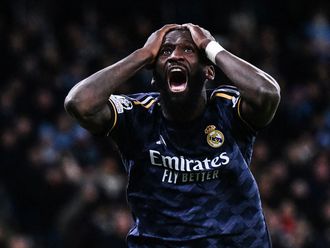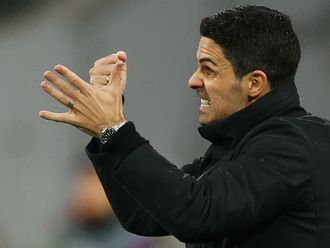Ever since injury curtailed his playing career aged 23, Belgian coach Tom Saintfiet has fought the underdog’s cause.
Having led Namibia up 34 positions in the world rankings and Ethiopia to within three minutes of victory over African powerhouses Nigeria in 2011 (they drew 2-2), ‘The Saint’ has built his reputation on salvaging football’s write-offs.
Now coach of Yemen, Saintfiet, 39, aims to overcome the odds once more in the same spirit that saw him battle six cruciate and three ankle ligament tears to re-study and become Belgian football’s youngest manager.
But since taking over Yemen in October he’s lost nine games on the trot, finishing bottom and without points in both their West Asian and Gulf Cup groups, losing two friendlies and their opening 2015 Asian Cup qualifier against Bahrain 2-0, last month.
For a side ranked 165th in the world, a record low, having now recorded 30 losses, 11 wins and seven draws in the past five years, the task is mountainous. Yemen last made the Asian Cup as South Yemen in 1976, but crashed out of the group phase without a point. They have never made a World Cup.
Financially limited, with no sponsors or government support, in a country not only without a league for seven months of the year, but also one which Western nations actively advise against visiting, Saintfiet may have finally met his match.
The team can’t even play their “home” matches inside the country due to its “deteriorating security situation”, but none of that stops Saintfiet from believing in miracles. “When I said I wanted to become a head coach at 24 years old, people said it wasn’t possible, but I proved it was,” Saintfiet told Gulf News.
“I believe that you can reach your goals if you believe in it and work hard for it. You don’t get anywhere without hard work and discipline. I’m a good role model to my players and a better coach because of all the injuries and bad experiences I have had to overcome.”
The former Westerlo, Lommel and Verbroedering midfielder added: “I still believe that with a bit of luck we can win in the future, but I have to be realistic too, Yemen is and will continue to be limited.
“Namibia, Zimbabwe and Ethiopia are more developed than Yemen. They have real football structures, good organisation and a good professional league, people love football and they have a long history. Yemen has the potential, but it needs support.
“Youth development is very basic. Our players are ‘street footballers’ and learned their skills by themselves. Yemen could take big steps forward in this, but it needs money.”
“It’s sad we can’t play at home, it isn’t fair,” continued Saintfiet, whose 2015 Asian Cup qualifying group contains Malaysia, Qatar and Bahrain. “Playing in Sana’a would make a huge difference in terms of the altitude and home support.
“But the reason I came here was to do the same miracles as I did elsewhere. And I still believe Yemen can spring a surprise and qualify for the Asian Cup.”
Boasting just seven losses in the last five years before joining Yemen, Saintfiet said: “I know I’m a top coach, I bring positive change everywhere I go. I have a clear structure, a plan of work and I’m never afraid of any task. Only losers are afraid.
“It’s easier to win the Champions League with Barcelona than it is to achieve good results with Namibia, Ethiopia or Yemen,” he added.
“In my last 10 years of coaching, I only lost 22 per cent of my matches. Check Jose Mourinho, Alex Ferguson or Josep Guardiola’s results. They worked with the best players, but check my stats with mediocre teams — I won 47 per cent and drew 31 per cent [of my games]. Winning the CECAFA Cup with the Young Africans and going unbeaten with Shabab Al Ordon shows I can also work with top teams and perform.
“My desire is clear: I want to work with a national team that can win cups, so the next step for me must be a stronger team. I want to work with the best and achieve the highest, my ambition is to manage a country at the World Cup.
“In the meantime, I want to help take Yemen forward, change their thoughts and style of football to build good foundations for the future. When I leave people have to remember me for the positive changes I have brought.”












